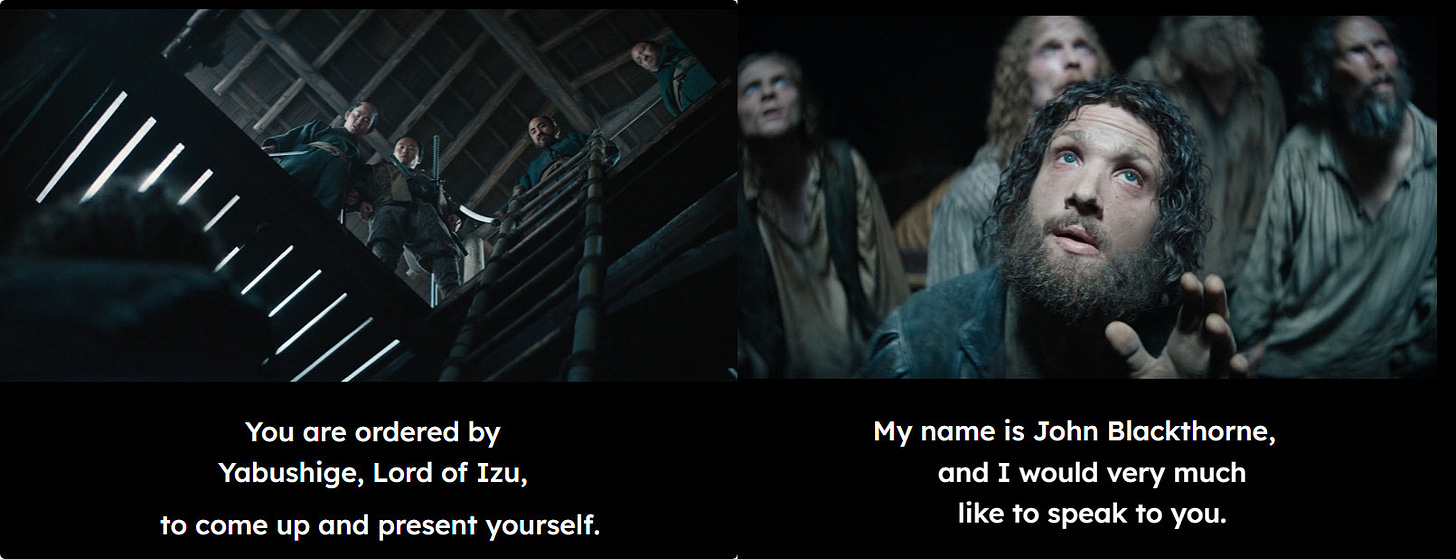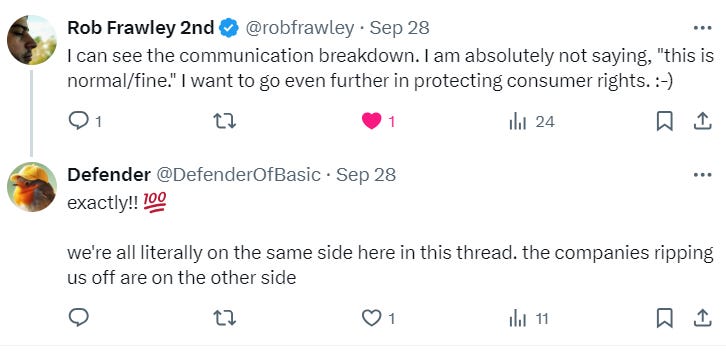In my last “anatomy of an internet argument”, I talked about my theory of how to have win-win, good faith arguments with even the most angry of internet strangers. I’d like to show you another real-world example here, and point out what went wrong.
The story begins with a viral tweet about Bjork that made a lot of people angry:
i think bjork is one of those artists that’s like a litmus test for taste
i just don’t think you have anything worthwhile to say about music or art if u don’t like bjork
1.9 million views - (tweet source)
Our protagonist, Chris, comes in with a good faith defense:
i think people need to be reminded that music is an art form and as with all forms of art, its subjective.
People proceed to pile on Chris for his “incorrect opinion”. Everyone gets angry & defensive. It gets pretty intense:
This is the most tragic of internet arguments because everyone involved here DOES agree. There’s no actual, fundamental conflict here. They’re just speaking different languages, and so each thinks the other guy is either stupid or malicious.
It’s exactly like this scene in ep1 of Shōgun. The English encounter the Japanese for the first time in history. The Japanese soldiers say, “we order you to come up!”. The English man says, “I will come up to talk, I will lay down my weapon”. The Japanese don’t understand what he’s saying, get frustrated that they’re not coming up, and become hostile.
They both literally want the same thing, and they both fail to get it, because they’re unable to communicate. This is the core of my theory of online arguments. Better communication doesn’t magically change anything, it just fixes cases like this.
I claim that there are many cases like this, everywhere, and especially in politics.
How do you reconcile “art is subjective” / “it is NOT subjective” ?
When people say “art is NOT subjective”, what they mean is that there is something empirical about it. That if you experience a LOT of art, you start to notice patterns, you start to see that some are all alike, some are different, some have a lot of beauty & complexity, and those pieces tend to inspire other pieces that build on it.
The claim is that, when you learn more about art, you will independently find things to be great that many others also find great. If this is true, then it is indeed objective to an extent.
This is why Honest Coldplay fan brings up “ignorance” and “critics”:
This isn’t true and it’s a claim only ever used to justify ignorance (similar to apolitical people saying “we’re screwed either way” because they haven’t learned enough to discern which candidate is better). Great critics like Clement Greenberg think art is somewhat objective.
On the other side, when Chris says “art is subjective”, he’s saying something very important that everyone in this discussion definitely agrees with: you can’t develop your own taste by pretending to like things you don’t actually like.
Chris is vehemently opposing a failure mode that he sees: when people don’t understand a piece of work, but all the smart people say it’s brilliant, they nod along and pretend they also think it’s brilliant. Chris thinks that’s what people are telling him. That if everyone thinks Bjork is incredible, and you think she’s not that good, then you’re wrong.
Chris is correct in standing his ground against this idea. Chris is correct in that what he needs to do is to keep enjoying art, keep articulating what he likes & does not like. This is, after all, what people on the other side want! This IS how you get to objective taste in art.
This is why he resists so much this idea that he needs to learn from critics, INSTEAD of thinking for himself:
Learn what exactly? How to form my own thoughts and opinions on things by experiencing them myself????
How would you fix this?
This one is super easy. All you need to do is repeat back what you think the other person is saying.
Chris could have said: “are you saying I should stop watching things I love and watch things the critics like, even if I hate it?” and the response would be, “of course not!”
What the other side should have done is acknowledge the truth in Chris’s statements. He’s not listening to them, because they keep telling him he’s wrong. But he’s obviously not wrong (that it’s important to think for yourself), so his opponents don’t make any sense. It’s very frustrating. To his credit, they totally *could* be people who have terrible (unrefined) taste and are just following what critics say, and not actually enjoying the art they rave about it.
Important takeaway: you don’t NEED the other side to be engaging in good faith. You can do this completely yourself. Any time you see someone saying something insane/stupid, just dig in. Keep asking questions. Figure out what exactly they’re saying, and why they believe it’s true.
These interventions work / open call to prove it
There were a lot of skeptics on Hacker News that my advice works, but it does. I had a recent case where people were yelling at each other about software licenses & video games. Emotions were high, no one wanted to back down. They were all clearly saying the same thing & yet couldn’t see it.
I came in and I asked questions, then repeated back this person’s argument in my own words. That diffused it. It went from calling each other idiot, pedant, smartass, to:
This is the holy grail of internet arguments. Not only do you understand the other person, the other person KNOWS you understand them. These are two different steps. A lot of times people THINK they understand, but they don’t. Their only explanation of the other’s position is “they’re an idiot”. If they really are an idiot, and you really are so smart, you should be able to predict what they’re going to say next. So, prove it. Articulate & flesh out their position, or how they would respond to another question.
Once they *feel* you understand them, they will now begin listening. After establishing rapport, showing him I was on his side, I told Rob why people were piling on him, what they thought he was saying. We had a happy ending:
I want to make an open call here, if you’ve encountered people in the wild that you feel like are lost causes, send it my way. I guarantee there’s a way for both of you to learn something (or you’ll prove me wrong!! Either way we’ll know the truth).
Final takeaway: it’s a failure mode to think of arguments as you vs them. It’s always: both of you in pursuit of the truth.






If I had to define the technique/perspective/skill that was lacking it would be something like asking a direct question that would force the other side to clarify themselves in relation to what you are claiming.
<Chris could have said: “are you saying I should stop watching things I love and watch things the critics like, even if I hate it?”>
at this point Chris would have won NO MATTER WHAT THE RESPONSE WAS!
you claim they would have said "of course not". But I don't think that it matters. Even if they have said yes, Chris would have an easy follow up- "explain" or better yet "explain- what you said is counter intuitive for me, and probably for many other people"
this is a little different than your claim I think. You said you have to repeat back to them what you think they said and check in. And the resolution would lie in the correction of communication.
I think the skill is more in asking a direct and clear question that would focus us on the topic at hand- even if everyone still disagrees.
I'm not sure /how/ different this is. But I think my way bypasses the need for compassion. You are trying to target the disagreement- not clear up and find out you really agree.
Does this make sense to you?
Admittedly I didn’t click into the Björk thread but I’m actually confused on what each party thought.
When Chris was saying I am going to form my own opinion by experiencing music did they think there was an element of I am going to dislike music for the sake of disliking music?
I think you outline part of the nuance which is that even though art is subjective there’s still patterns and elements that you can comment on and appreciate it. Is the problem that people thought Chris was undermining all of that?